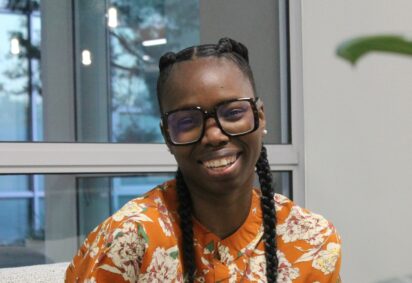
Vuyolwethu Matiwane, or Vuyo, is a Technical Project Development Manager (formerly Grid manager) at BTE Renewables, an energy producer with utility-scale wind and solar projects across Africa. She holds a Bachelor in Electrical Engineering and is currently concluding her Master’s in Wind Energy at DTU in Denmark.
Vuyo grew up in a village without electricity in the Eastern Cape without electricity. One day her father, who worked in a mine, brought home a small solar panel. The device allowed the family to charge their phones and batteries and listen to the radio. It was just a start, but Vuyo’s fascination for electricity was born. She was good at school, so it was always clear that she would go to university, despite multiple barriers: She needed a bursary, for which she had to be a top student. And once her classes started, she realized that only a quarter of her classmates in electrical engineering were women.
“Be scared, but do it anyway”
For years at work, Vuyo was usually the only female and often the youngest in the room – not an easy situation, especially for an introvert like her. She had to face internal barriers, and she wondered if she belonged and if anyone wanted to hear her opinion. That is when Vuyo decided on a rule that she has followed ever since: never to leave a meeting without saying something. “Confidence builds over time. Be scared, but do it anyway”, Vuyo says with a smile. “If I did not speak up in that meeting back then, I would not be speaking in auditoriums in front of 100 people now.”
The energy sector is still a man’s world – and not only in total numbers: men also hold most senior positions. Vuyo says she always felt like she had to be exceptional at her job, so that nobody could say she was not good at it because she is a woman. “On the one hand you have impostor syndrome, on the other hand, you have to be the best”, she says, laughing. This pressure, combined with a heavy workload and site visits that can sometimes take weeks, leaves little time for a partner or family. “Reduced working hours are not common in South Africa but would help women to have a career and a family. As would being able to work partly from home and having day-care centres at offices for those with families and kids.”
Guiding women to start a career in renewables
Even though there is still a lot that needs to change, Vuyo sees a positive trend: the industry is actively looking to employ more women, and the energy transition is creating new jobs that allow women to be in technical positions without doing hard physical labour. In her opinion, job information campaigns and mentorship programmes should start in high school, because that’s when kids start making decisions about their career. She regrets that she never had a mentor that could show her the ropes. Now she is part of the mentoring programme “Energising Women to Advance the Energy Transition”, organized by the Global Women’s Network for the Energy Transition (GWNET) in partnership with the Deutsche Gesellschaft für Internationale Zusammenarbeit (GIZ), and wishes to take on that role herself and guide other young and emerging female professionals in the renewable energy sector. It’s about time that she is no longer often the only woman in the room, she adds.
This article is the summary of an interview, conducted in the course of our research on opportunities and barriers for women in the power sector in South Africa.
